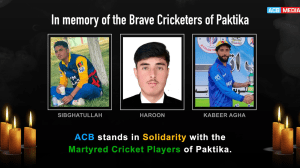Poonch massacres result of row over women — Officials
JAMMU, JULY 8: The two massacres that took place in Poonch district late June and early this month were each the outcome of a dispute ove...

JAMMU, JULY 8: The two massacres that took place in Poonch district late June and early this month were each the outcome of a dispute over a woman and had no link with the so called `jehad’ (holy war) of pro-Pakistan militants, official sources said.
Fifteen Muslims, including women and children, were killed by militants in Poonch district on June 28. Three days later (July 1), militants killed nine Hindus.
The 15 members of two Muslim families were killed at Morah Bachhai (Surankot tehsil) as one of the women in the family had scorned the advances of a Pakistani militant. Meanwhile, the deceased at Ari (Mendhar tehsil) were close relatives of a youth who had eloped with a girl from another community.
Official sources told The Indian Express that a Pakistani militant, code named Tabish, had been making advances at Suraiya, who was married to a resident of Mendhar. She was also the aunt of Kousar Mehmood, former district commander of Hizbul Mujahideen.
While Suraiya paid no heed to themilitant’s attention initially, she approached her nephew for protection after Tabish started pressing her to accompany him to Pakistan.
Kousar threatened Tabish against harassing his aunt. Angered, the Pakistani militant with the help of other foreign mercenaries operating in the area got Kousar replaced by another militant, Khaleel Khan, as district commander of the Hizbul Mujahideen.
Though Kousar and Khaleel were related, they had their differences over to a land dispute between their families. However, as only Kousar knew of the dumps of arms and ammunition brought in from Pakistan during the past, Khaleel and his foreign militant friends decided to spare him for the time being.
Later, on the pretext of a making peace, some started persuading Kousar to disclose the places where he had dumped the arms and ammunition. However, the latter being aware to the impending threat to his life, refused to oblige.
Meanwhile, the news of the wedge between Kousar and the foreign mercenaries reached thepolice. Taking advantage of the situation, the police persuaded Suraiya to persuade her nephew to surrender, sources said.
She readily agreed and visited one of the Kousar’s men at Phagla with a message for her nephew. The militant leader, however, asked her to wait for him at the house of another person in the area. Before Kousar could reach the specified place to meet her aunt, some foreign mercenaries including Tabish, abducted Suraiya. They raped her and later killed her on charge of being a police informer.
Even after killing Suraiya the foreign mercenaries continued mounting pressure on Kousar to reveal the location of the dumps, said a senior police officer. The latter, however, chose to remain mum.
Irked by Kousar’s continuous refusal, the mercenaries along with Khaleel swooped on Morah Bachhai on the night of July 1 killed 15 members of two families and set on fire their house.
While J&K Chief Minister Farooq Abdullah has ordered a magisterial inquiry into the matter, Zubeda, who was injuredin the shoot-out, has identified three of the killers. They are reported to be members of the Khaleel group.
Similarly, about the Ari massacre, sources said that militants were annoyed with a village youth, Shankar, who had eloped with a girl, Sofiya, of another community. There had been protest demonstrations and even bandh in the area over the incident.
The militants swooped on the village and found Shankar’s house locked, as he along with the family had already shifted to Mendhar town for safety. Thereafter, they encircled three houses belonging to his close relatives and killed nine people.






- 01
- 02
- 03
- 04
- 05

























